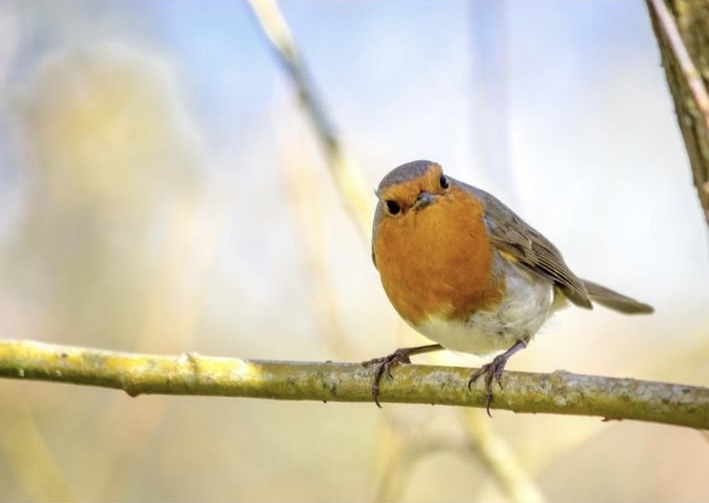One of the most common sights in any garden during the spring and summer is a robin. These brightly-coloured birds are easy to identify by their red breast, and they can often be seen perched on a tree or fence, watching for insects. Robins tend to bob their heads up and down as they search for food, and you may have seen them picking worms off the ground. But can robins actually hear worms?
In this post, we’ll take a closer look at the auditory abilities of robins and find out if they can indeed hear worms.
Robins often used their senses to find food. They can see well, have a good sense of touch, and hear well. There is some evidence that suggests that robins can hear worms. One study found that when robins hear worms moving underground, they would fly to that spot and start to eat the worms. However, it is still not clear how robins are able to hear the worms. Some scientists believe that robins may be able to sense vibrations in the ground, while others believe that they may hear the worms moving underground. One thing is very clear, though, robins use their sight, touch and hearing to find food, and worms are a favourite food of theirs.
Birds, like robins, use different senses to find worms. Some rely more on their sense of sight, while others might rely more on their sense of touch. Nonetheless, robins used some of their senses to find worms.
- Sense of sight: Birds that rely more on their sense of sight to find food usually have better eyesight than other birds. Robins can see the tiny end of a worm sticking out of the ground. The small changes in the colour of the land as a worm moves help robins find their prey.
- Sense of touch: Robins also use their sense of touch to find food. They can feel the vibrations that a worm makes as it moves underground. The vibrations are sensed through the bird’s feet, which is why some birds can find prey even when they cannot see it.
- Sense of hearing: Worms moving around in the soil can cause it to become disrupted. This can lead to the soil becoming loosened and small particles of dirt rubbing together and making a noise that certain birds can hear. Robins can hear the worms moving underground and fly over to that spot to eat them. Birds have an exceptional sense of hearing. They use this to find prey in the soil, especially by listening for the movement of the prey. However, there are no available in-depth studies to prove that any birds can forage worms by using only their sense of hearing.
Nevertheless, robins can use their sense of smell, sight, and hearing to find food. They are one of the few birds that can forage for worms by using any combination of these senses. This makes them very efficient in finding their prey.
If you want to help robins find worms, there are a few things that you can do:
- One is to leave the fallen leaves on the ground. This will help create a natural habitat for the worms, and it will also make it easier for the robins to find them.
- Another thing that you can do is to plant some trees and shrubs. This will give the robins somewhere to perch while they look for worms and shelter them from the wind and rain.
- You also have to keep your grass mowed short. This will make it easier for the robins to see the worms since they crawl around on the ground.
- Keep your lawn in good condition by aerating it every year and removing thatch. This way, the soil will be less compacted and easier to work with. It will also be easier for the robins to reach the soil to forage the worms.
- Watering your lawn or garden can also help to bring out the worms. The worms will come up to the surface to get moisture, and the robins can easily snatch them up.
- You can also put out some bird feeders in your yard to help attract robins. This will give them a place to eat when they’re not finding worms.
There are plenty of garden birds in the UK, and robins are one of the most common sights found in various habitats. They can be found in areas with trees, like gardens and parks, as well as in hedgerows. They are very territorial and can be quite aggressive towards other birds, particularly during the breeding season.
Robins are easy to identify due to their distinctive red chest, and they are one of the few birds that sing all year round. This is used to communicate with other robins and mark out their territory. Robins have a beautiful red chest which is very conspicuous, particularly when he sings on top of a high perch. This serves as a warning to other robins that this is his territory.
Robins are omnivorous and eat a variety of things, such as insects, earthworms, berries and seeds. Robins forage on the ground or in low vegetation. One of their favourite foods is worms, which they find by poking around in the soil with their beak.
They will often go down to pick up the vibrations from the ground and then use their beak to dig out the worm. Robins can identify worms even when they are hidden under leaves or soil.
There is still much research to be done on this topic, but current evidence suggests that robins can indeed hear worms. This ability likely helps them locate food sources in their environment. Moreover, by understanding how robins forage worms, we can help create an environment that is more conducive to their needs. By doing so, we can help these beautiful birds thrive.

